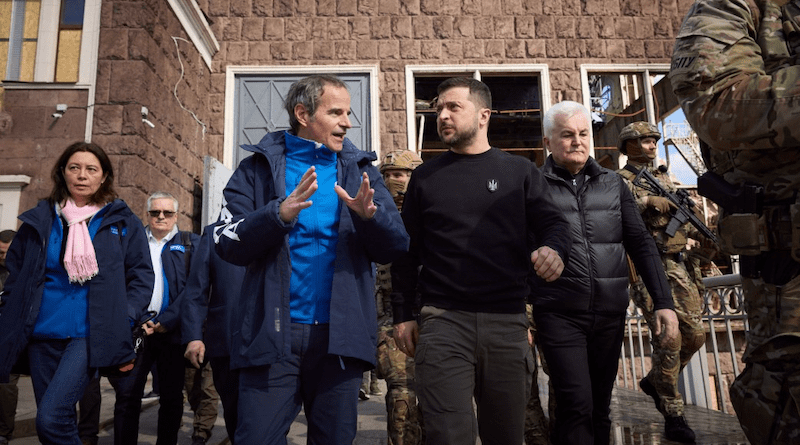IAEA Chief Says Deal To Protect Ukraine Nuclear Plant Could Be ‘Close’
By VOA
A deal to secure the safety of Europe’s largest nuclear power plant in Ukraine could be “close,” although final details have yet to be agreed upon by Russian and Ukrainian officials, the chief of the International Atomic Energy Agency said Tuesday.
IAEA Director General Rafael Mariano Grossi told reporters he met Monday with Ukrainian President Volodymyr Zelenskyy and would “most probably” head to Russia in the coming days to try to finalize an agreement to protect the nuclear plant at Zaporizhzhia. Fierce fighting for months near the facility has international officials worried about a nuclear disaster, with the potential for radiation spreading far beyond the immediate war zone.
“There is an increased level of combat, active combat” near the power plant, Grossi said. “My teams there report daily about the attacks, the sound of heavy weaponry. This is practically constant.”
Grossi has long called for a protection zone to be created around the plant, which is very near the front line of the war. But no agreement has been reached.
“It is a zone of extreme volatility. So, the negotiations are, of course, affected by the ongoing military operations,” Grossi said. “I would not characterize the process for the last few months as one that has not led to any progress.”
Grossi said he has maintained a professional dialogue with both Russian and Ukrainian officials as he seeks a deal “to ensure … that there is no radiological accident, major catastrophic accident, in Europe.”
“I think it’s close,” he said of the possibility of a deal. “Obviously, obviously, I need a political commitment, political decision. And in this case, what I want to stress is that what they would be agreeing is on the protection of the plant. They are not agreeing with each other. They are agreeing with the IAEA. They are agreeing with nuclear safety and security. This is a very important element which I believe should be taken into consideration.”
He said any such agreement would be limited to protection of the nuclear plant, not aimed at securing a broader cease-fire.
“What we are doing, the way we are presenting things is as a series of principles or commitments that the IAEA presents and everybody would be able to support,” he said. “So, in my opinion this should make an agreement possible, not impossible, not utopian, not something for which we should be waiting for months and months on end.”
Because of the fighting, he said, “I think the principle here is to avoid an accident, and the possibility of having it is increasing. This is a matter of fact.”
New Russian attacks kill three
Ukraine’s presidential office said at least three civilians were killed and 43 others wounded in the latest Russian attacks involving drones, gliding bombs and heavy artillery. Most of the attacks were in the eastern Donetsk region, where Russian shelling hit 12 towns and villages. The southern city of Kherson was also targeted.
Russia has continued its long-range bombardment of Ukraine with Iranian-made Shahed exploding drones. But Kyiv said it shot down 14 of the 15 drones Moscow’s forces launched Monday night.
Meanwhile, President Zelenskyy on Tuesday visited two war-torn cities in the northern Sumy region of the country, Okhtyrka and Trostianets, where fierce fighting occurred a year ago before Russia withdrew. He was continuing his tour in recent days of some of the cities that have borne the brunt of Russia’s 13-month invasion.
Intense fighting occurred in Okhtyrka but was never occupied by the Russians, while Trostianets was held by the Russians for a month but liberated by Ukrainian forces a year ago.
Zelenskyy met with officials and residents in both cities, telling a crowd on a square in Okhtyrka that the city would be rebuilt.
“We won’t let any wound remain on the body of our state,” he said.
Zelenskyy honored soldiers at the local railway station in Trostianets, where Ukrainian authorities say the Russians tortured prisoners.
In the last week, Zelenskyy has visited the Kherson and Kharkiv regions, parts of which Ukraine has liberated form Russian control, as well as the still-contested areas near Bakhmut and Zaporizhzhia.
Belarus blames West for decision to host Russian nukes
Belarus said Tuesday that political and economic pressure from the United States, Britain, NATO and the European Union prompted its decision to host Russian nuclear weapons on its soil.
“In view of these circumstances, and the legitimate concerns and risks in the sphere of national security arising from them, Belarus is forced to respond by strengthening its own security and defense capabilities,” the Belarusian foreign ministry said in a statement.
Belarus further said that Russia’s plans to station tactical nuclear weapons in Belarus would not go against international non-proliferation agreements, and that the Belarusian government would not be in control of the weapons.
Putin announced on Saturday the deployment of the tactical nuclear weapons, saying it was warranted because of the West’s increasing military support for Ukrainian forces, including Britain’s decision last week to send armor-piercing rounds containing depleted uranium to Ukraine.

